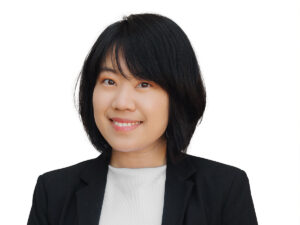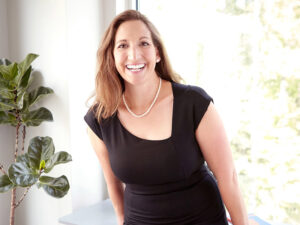Alaa Alsaafin’s story is one of determination and overcoming numerous obstacles. Born in the UAE and originally from Palestine, Alaa moved to Canada at a young age, navigating the complexities of growing up as a Muslim woman amidst cultural and educational challenges. Despite societal expectations that initially steered her away from engineering towards life sciences, she excelled in her chosen field, proving herself through hard work and dedication.
Her transition from a student to a respected PhD holder, where she became a mentor for young Muslim women, marks a significant chapter in her life, showcasing her influence and the importance of role models in academia.
Her professional journey is shaped by her personal experiences. As an analyst for some of the world’s largest pharmaceutical companies, she gathers crucial data and insights that impact global healthcare. Her role as a business analyst at Lifescience Dynamics Limited speaks to her expertise in life sciences and her ability to break through barriers that once seemed insurmountable. These experiences not only underline Alaa’s career growth but also reflect broader themes of inclusion and diversity in science and technology fields, especially for those from underrepresented backgrounds.
Check out our full interview with Alaa Alsaafin below.
Could you walk us through your early life experiences immigrating from the UAE to Canada and how they shaped your ambitions?
Alaa Alsaafin: Immigrating from the UAE to Canada was an exciting experience that profoundly shaped my ambitions and outlook on life. In UAE, I did very well in school and my family ensured that we focused on academics and extracurriculars to have a well-rounded education.
When I immigrated to Canada, it was initially challenging, as I had to learn a new language, navigate unfamiliar customs, and understand the nuances of Canadian society. Despite these inevitable hurdles, I was determined to embrace this new chapter with resilience and hopefulness.
I was lucky to have been surrounded by friends who ensured that I felt included and shared similar determinations to pursue their ambitions. Interacting with them and other students from various cultural backgrounds enriched my perspective and instilled in me a sense of empathy and understanding.
Growing up, you faced pressures stemming from cultural expectations regarding gender roles. Can you share how this impacted your career choices and ultimately led you to life sciences instead of engineering?
Alaa Alsaafin: Growing up, there were pressures stemming from cultural expectations regarding gender roles, particularly regarding career choices. In many traditional societies, there are entrenched beliefs about what professions are suitable for men versus women.
For example, I was initially drawn towards engineering, a field often perceived as more suitable for men. I accepted this and as such, I explored various career options, I found myself increasingly drawn to life sciences. This shift was influenced by several factors, one of which was to pursue a field that resonated more deeply with my passions and interests.
In my undergraduate degree, I found inspiration in female professors who made significant impacts on students and the field of life sciences. I feel more comfortable with my decision now, but I am now motivated to ensure that subsequent generations feel content about defying stereotypes and carving out their own unique identity, irrespective of societal pressures.
You’ve spoken about the challenges of earning respect in an academic and professional environment as a Muslim woman. How did you navigate and overcome these barriers?
Alaa Alsaafin: I began by focusing on building confidence in my knowledge, skills, and capabilities. I tried to get involved as much as possible with additional tasks at work or extracurricular activities during graduate school, which was crucial in overcoming self-doubt and gaining respect from others.
In those roles, I strived for excellence in everything I did. I consistently expected myself to deliver high-quality work, which has earned me the respect of colleagues and peers regardless of any preconceived notions based on gender or religion.
I was told that I had set an example for Muslim women in my work previously, as some of my colleagues have not had a chance to work with one. I actively engaged in educating others about my cultural and religious background, which fostered a sense of understanding and dispelled misconceptions. By leading by example and breaking down barriers, I helped pave the way for greater representation and inclusivity in traditionally male-dominated fields.
Mentorship appears to have played a crucial role in your career, both as a mentor and a mentee. How important do you think mentorship is in professional development, especially for women in STEM? Can you share an instance where you directly impacted someone’s life or career trajectory through mentorship?
Alaa Alsaafin: Mentorship is incredibly important in professional development, especially for underrepresented groups such as women in STEM fields. Mentoring for women in STEM can help break down barriers and navigate the ‘system,’ whether that falls under gender bias, lack of representation, or imposter syndrome. I have had many mentors throughout my professional journey; each one was instrumental in encouraging me, asking me hard questions, and sharing strategies and tips for success.
As a personal example, I mentored a young woman who was unclear about what she wanted to pursue as a career. I could see that she was passionate about science but was struggling with self-doubt and confidence issues. We regularly chatted, and I provided her with guidance and encouragement and shared my own experiences thus far. Seeing her succeed later on and thrive in her chosen field was incredibly rewarding, and it reaffirmed my belief in the power of mentorship and passing it forward.
You’ve lost an unimaginable number of relatives in recent months. (My heart goes out to you and your family) How has personal tragedy affected your approach to your work and life goals?
Alaa Alsaafin: Thank you for your understanding. The ongoing tragedy in Gaza, both as a current event and on a deeply personal level, has profoundly reshaped my perspective on life and my goals. It has heightened my awareness of my identity as a Palestinian, a facet of myself I had not previously been too vocal about.
Now, I am actively engaged in raising awareness and advocating for Palestinian rights. I am committed to doing more research on the facts and striving to make a meaningful difference for both myself and my people. The loss of loved ones amid ongoing conflict is a pain that never truly fades, as it reminds me that everyone deserves to live a life with dignity and freedom. This commitment has become a focus of my life goals, and I will do whatever I can to help.
Looking back, is there anything you would do differently in your career journey, knowing what you know now?
Alaa Alsaafin: I recognize that I have relied too heavily on external validation to gauge my self-worth, a habit that can be debilitating. Moving forward, I am committed to prioritizing self-care and achieving a better work-life balance. Burnout can sneak up unnoticed, so actively taking the time for personal well-being is crucial as it ensures both fulfillment and sustained success in the long term.
Additionally, I would embrace discomfort and pursue more opportunities for growth and advancement outside my comfort zone. I have discovered that when I did so, I was always pleased with the outcomes and had a closer idea of who I am and what I want.
In what ways do you think the pharmaceutical industry can better serve areas of conflict or regions with limited access to healthcare, considering your personal connections to such areas?
Alaa Alsaafin: There are different ways the pharmaceutical industry can serve areas of conflict; for example, pharmaceutical companies can develop affordable pricing or implement expanded access based on the region’s economic status.
Pharmaceutical companies can also provide humanitarian aid to those regions and collaborate with local governments and non-profit organizations to efficiently distribute those medications and healthcare services.
Lastly, it is vital to support the healthcare system, which is effectively crumbling in Gaza. More support for healthcare workers is needed, whether by providing them with medical equipment or establishing telemedicine services to reach patients easily.
Finally, as you continue to navigate your career and personal goals, what future aspirations do you have, and how do you plan to achieve them?
Alaa Alsaafin: As I continue on my career and personal journey, I aspire to continually expand my skills and knowledge. I would love to make a meaningful impact in whatever role I hold. I want to take on more leadership roles where I can inspire and empower others while also contributing to projects that positively influence society. To do this, I will be engaging in ongoing learning opportunities, whether through courses, workshops, or self-learning. I will also leverage my network by seeking mentorship from professionals who can support and guide me.
I am always open to new challenges, where I view them as opportunities to grow and learn more about myself and others.
Published in Featured Articles, Featured WomenEmily Sprinkle, also known as Emma Loggins, is a designer, marketer, blogger, and speaker. She is the Editor-In-Chief for Women's Business Daily where she pulls from her experience as the CEO and Director of Strategy for Excite Creative Studios, where she specializes in web development, UI/UX design, social media marketing, and overall strategy for her clients.
Emily has also written for CNN, Autotrader, The Guardian, and is also the Editor-In-Chief for the geek lifestyle site FanBolt.com






